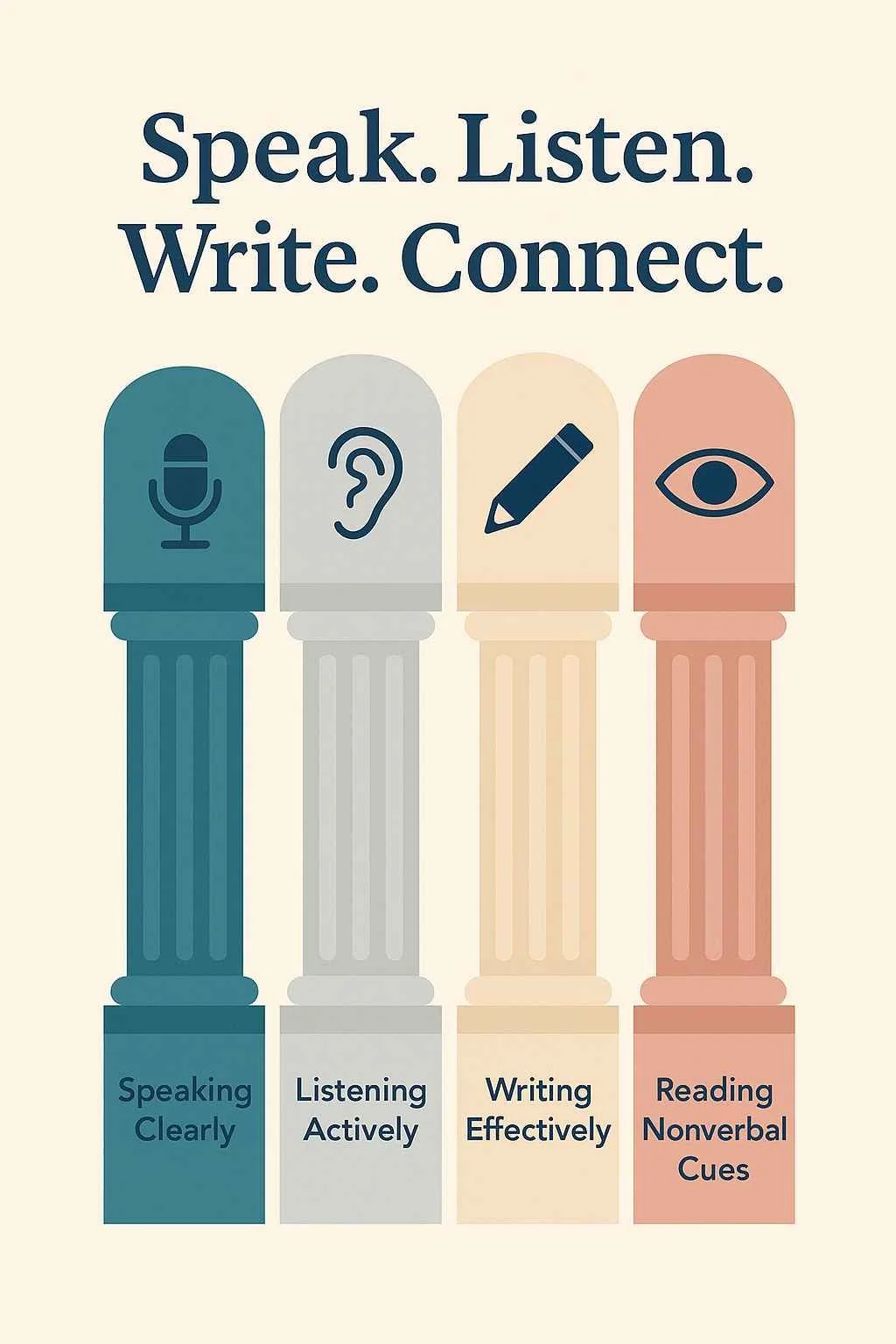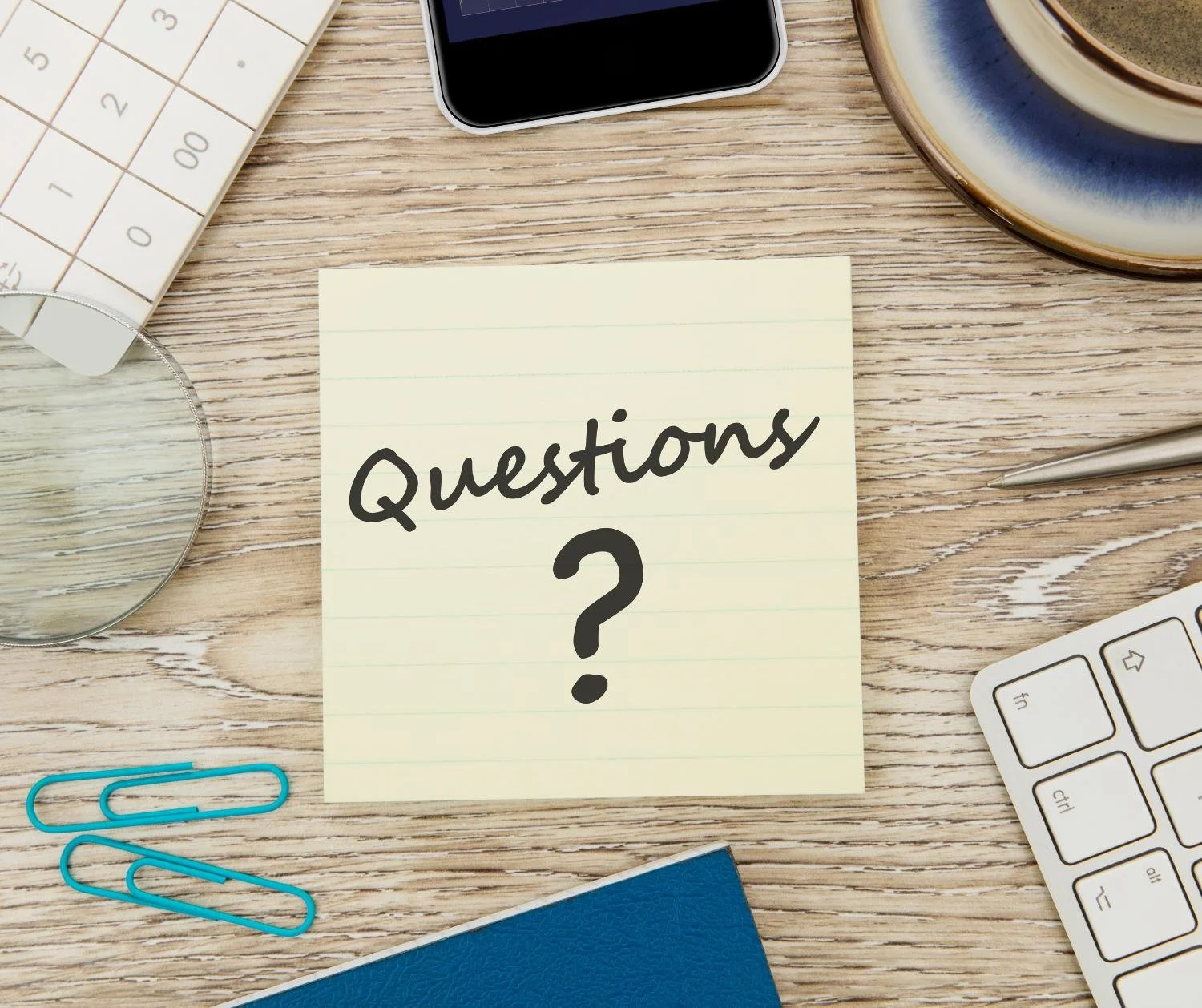Professional Communication Training for Workplace Success
Leading a project, working with a team, or presenting new ideas all require strong communication skills. Verbal and written communication skills play a crucial role in your professional growth. Still, for many people, speaking with clarity, confidence, and empathy takes work.
Professional communication training provides a clear path to develop those skills. It covers everything from listening and body language to interpersonal, persuasive, and written communication.
This kind of training isn’t just for executives. It’s for anyone who wants to communicate more effectively, handle tough conversations, and improve everyday interactions at work.
Key Takeaways:
Why Workplace Communication Matters More Than Ever: Clear, respectful communication builds trust, improves teamwork, and helps prevent misunderstandings that can hurt productivity and morale.
What Is Professional Communication Coaching?: It’s structured guidance to help individuals speak, write, and listen more effectively in the workplace, tailored to real-life situations.
Who Can Benefit From This Kind of Training: Anyone, from shy speakers to rising leaders, can gain confidence and clarity through go communication skills training.
What to Expect from a Communication Skills Training: The training is practical and supportive, often incorporating role-play, writing exercises, and non-verbal communication practice to build real-world confidence.
Why Workplace Communication Matters More Than Ever
What Is Professional Communication Coaching?
Who Can Benefit From Training To Communicate Effectively?
What to Expect from a Communication Skills Training
Why Workplace Communication Matters More Than Ever
Workplace communication is more complex than it was in the past. Hybrid schedules, nonstop messages, and high-stakes conversations with decision makers make it easy for meaning to get lost.
Let’s take Marcus, for example. He’s a project manager leading a remote team across three time zones. He sends a message asking for updates “by the end of the day,” assuming everyone knows he means Eastern Time. One teammate thinks he has until his own evening. Another misses the message entirely until the next morning. The deadline slips. Frustration builds. A few extra words could have kept the timeline clear for everyone.
Now consider Priya, a new hire eager to make a contribution. She joins her first Zoom meeting and wants to speak up, but hesitates. Without in-person cues, she can’t tell when it’s her turn or how her message will be received. Her strong ideas stay unspoken. A little more support around listening skills and persuasive communication would help her step in with more confidence.
These situations happen every day. Even minor communication breakdowns can slow progress, lower morale, or lead to avoidable mistakes. Effective communication skills help prevent these problems by fostering trust, enhancing collaboration, and driving better business outcomes.
To communicate effectively in today's workplace, professionals need more than just the right words. They need the ability to speak clearly, listen actively, and adapt across different settings and audiences.
What Is Professional Communication Coaching?
Professional communication coaching helps individuals refine their speaking, listening, and writing skills in a work setting. It offers practical tools for expressing ideas clearly, adapting to different situations, and connecting with others in a more thoughtful way.
This kind of training prepares you for real workplace moments. You might be presenting to decision-makers, writing a high-stakes email, or engaging in a tough one-on-one conversation. Coaching helps you approach those moments with confidence and clarity.
Think back to Priya. With coaching focused on listening skills, body language, and persuasive communication, she could learn how to read the virtual room, know when to speak, and feel more confident sharing her ideas. Or Marcus, who struggles with written communication across time zones, could benefit from clearer messaging strategies that reduce confusion and help keep projects on track.
A strong program covers both what you say and how you say it. You learn how to communicate through the written word, use nonverbal cues that support your message, and handle difficult conversations without escalating conflict.
Key skills include active listening, interpersonal communication, persuasive communication, and emotional intelligence. These skills help you respond more effectively and build stronger relationships in your role.
Communication training is valuable for anyone. New employees, mid-level staff, and seasoned professionals can all benefit from building effective communication habits. It’s a step toward being heard more clearly, understood more easily, and respected more consistently in any role.
Who Can Benefit From Training To Communicate Effectively?
Professional communication skills training isn’t just for executives or public speakers. It’s for anyone who wants to improve how they connect and interact with others at work.
Individuals starting a new job, transitioning into a new role, or seeking to advance in their current position can benefit from developing stronger communication habits. Good communication skills help make daily interactions smoother, more respectful, and more productive.
For Those Who Feel Nervous Speaking Up
If meetings or presentations make you anxious, communication training provides the support you need to build your confidence. You learn how to organize your thoughts, stay grounded under pressure, and speak clearly in front of others.
This could make a real difference for someone like Priya. With training in interpersonal communication and emotional intelligence, she could learn how to manage anxiety, read the room more effectively, and contribute her ideas without hesitation.
For Employees Struggling with Tone, Clarity, or Writing
Some professionals are confident speakers but need help refining their written messages, word choice, or tone. Coaching can help you choose the right words, write clearer emails, and sound more professional in conversations.
Think about Marcus. His team respects him, but his vague written instructions cause missed deadlines. Focused coaching could help him use more precise language and strengthen his messaging across platforms.
For Professionals in Transition or Growth
If you’re transitioning into a leadership role, switching careers, or taking on new responsibilities, effective communication is essential. Training equips you with the tools to lead discussions, influence outcomes, and tailor your message to suit different audiences and settings.
For Supportive Family and Friends
If someone you care about is talented but struggling with communication challenges, your support can help them move forward. Encouragement from family or friends often makes it easier to take that first step toward growth.
Strong communication abilities are a long-term investment. They support workplace success, strengthen relationships, and lead to a deeper understanding of how to connect with others, both professionally and personally. Developing good communication skills helps people feel more capable in every part of life.
What to Expect from a Communication Skills Training
Communication skills training is practical, supportive, and tailored to real-world workplace needs. Depending on your goals and comfort level, you may work one-on-one with a coach or participate in a small group session. Both formats offer a safe and encouraging space to build your skill set and grow at your own pace.
Sessions include hands-on activities that reflect real-world challenges. You might role-play tough conversations, practice professional writing, or explore nonverbal communication through body language and facial expressions. These exercises help make the learning process active and relatable.
You’ll receive personalized feedback to help you recognize your strengths and work on areas that need improvement. The goal is to develop strategies you can apply immediately and tools that support stronger, more effective communication at work.
For Priya, that might mean practicing how to speak up with more ease during virtual meetings. For Marcus, it could involve refining his writing style and adjusting his tone to match different audiences. Both are developing a more confident, adaptable skill set.
One of the most rewarding parts of communication training is seeing real progress. You might lead presentations more smoothly, write with more clarity, or feel more grounded in meetings. Whatever your focus, training helps you communicate with greater purpose, connection, and confidence.
How To Improve Verbal Communication Skills
Check out our blog about improving verbal communication skills for more information!
How to Get Started
Start with Your Goals
Taking the first step toward improving your communication skills can feel like a big decision, but it doesn’t have to be overwhelming.
A good communication training provider will take time to understand your goals, whether you're looking to speak more confidently, improve written communication, or handle workplace interactions with ease.
Find the Right Communication Course or Coach
Look for communication courses or coaching programs that offer practical exercises, experienced coaches, and a supportive environment.
Clear communication, realistic goals, and a supportive approach are all signs you’re in the right place.
Ask Questions and Explore Your Options
Don’t be afraid to reach out and ask questions. A conversation with a potential communication coach can help you gauge their approach and determine if it aligns with your needs.
It’s Never Too Late to Grow
The truth is, it’s never too late to develop the essential skills needed to improve your communication. Even minor changes can lead to big improvements in confidence, career growth, and workplace relationships. All it takes is the willingness to begin.
Frequently Asked Questions About Professional Communication
1. What are the 4 types of professional communication?
The four main types are verbal, nonverbal, written, and visual communication. Verbal involves speaking, nonverbal includes body language and tone, written covers emails and documents, and visual includes items such as charts or slides. All of these work together to help you communicate more clearly and professionally.
2. What are the 7 principles of effective communication skills?
These key principles are clarity, correctness, conciseness, concreteness, consideration, completeness, and courtesy.
When you follow them, your message becomes easier to understand, more respectful, and better suited to your audience, making you a stronger communicator.
3. Why is feedback important in professional communication?
Feedback helps you improve by pointing out what you’re doing well and where you can grow. It encourages better teamwork, clearer communication, and stronger relationships in the workplace. When used thoughtfully, feedback is one of the most helpful tools for professional development.
4. What does emotional intelligence mean?
Emotional intelligence is the ability to recognize, understand, and manage your own emotions, while also being aware of how others feel. In the workplace, it helps you respond calmly under pressure, build stronger relationships, and communicate with empathy and self-awareness.
5. How does using good body language help build relationships?
Good body language, such as maintaining eye contact, an open posture, and a calm tone, shows that you’re engaged and respectful. It helps others feel heard and valued, which builds trust and makes conversations more productive. Strong nonverbal communication supports clearer, more positive connections at work.
How Connected Speech Pathology Can Help
Connected Speech Pathology provides professional communication skills training to help individuals speak with greater clarity, write with increased impact, and feel more confident in the workplace.
You may be starting a new job, preparing for a leadership role, or seeking ways to develop your own communication skills. Our personalized approach meets you where you are and helps you move forward with purpose.
Sessions are delivered remotely, giving you access to expert support from anywhere. Through one-on-one or small-group sessions, we focus on hands-on practice, thoughtful feedback, and practical strategies that work.
The skills you build here support not only your career but also your personal growth. They carry into your personal life, enhancing relationships and improving everyday interactions.
Priya gained the confidence to contribute in meetings without second-guessing herself. Marcus learned to communicate more clearly with his remote team and avoid confusion. You can also strengthen your skills with the right support, clear goals, and real-life practice.
Summary
Effective communication skills can transform the way you work, lead, and connect with others. You might be aiming to boost confidence, improve clarity, or support someone on their journey. Professional communication coaching provides practical tools that foster lasting growth.
With the proper guidance and support, it is never too late to strengthen your skills and thrive in the workplace.
About the Author
Allison Geller is a communication coach, speech-language pathologist, and founder of Connected Speech Pathology, an international online practice providing professional communication coaching and speech therapy for children, teens, and adults. With more than two decades of experience, she has worked in medical and educational settings, published research on aphasia, and leads a team of specialists helping clients improve skills in public speaking, vocal presence, accent clarity, articulation, language, fluency, and interpersonal communication.










